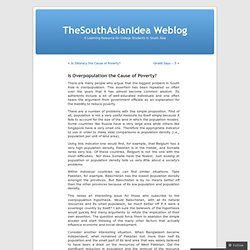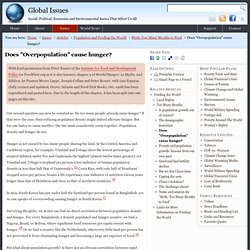

2-pager on Population & Dev. The Links between Population & Development. Rio+20: Key Messages. "Overpopulation" and Poverty. Overpopulation vs Overconsumption. Over the past few decades, one of the greatest threats on civilization and our future on the planet has been, according to a number of scientists, overpopulation.

It made sense, say, 30 to 40 years ago, to look at the population-growth rate and say that it was soon about to exceed sustainable limits. Is Overpopulation the Cause of Poverty? There are many people who argue that the biggest problem in South Asia is overpopulation.

This assertion has been repeated so often over the years that it has almost become common wisdom. Overconsumption, not overpopulation, is the problem. David Suzuki.

What’s the biggest challenge in the world? Climate change? Economic disparity? Species extinction? A western billionaire—maybe a member of the one percent the Occupy protesters are talking about—will likely say population growth. Does "Overpopulation" cause hunger? With kind permission from Peter Rosset of the Institute for Food and Development Policy (or FoodFirst.org as it is also known), chapter 3 of World Hunger: 12 Myths, 2nd Edition, by Frances Moore Lappé, Joseph Collins and Peter Rosset, with Luis Esparza (fully revised and updated, Grove/Atlantic and Food First Books, Oct. 1998) has been reproduced and posted here.

Due to the length of the chapter, it has been split into sub pages on this site. Our second question can now be restated as: Do too many people already cause hunger? If that were the case, then reducing population density might indeed alleviate hunger. But for one factor to cause another, the two must consistently occur together. Population density and hunger do not. Hunger is much more than not having enough to eat. 25/11/2010 at 11:22 am Amid all the political upheaval, we are very pleased to say that a good few TDs and Senators found time this week to attend an event of importance to those of us who are concerned with global issues.

On 23 November, Concern, AWEPA and Dóchas hosted a seminar for members of the Oireachtas (the Irish Parliament) about global hunger, to mark the launch of a new publication, the Global Hunger Index. Hunger is a key global justice issue With one in every six people on the planet going hungry, it is surprising to note to what extent Hunger had gone “out of fashion” in global development thinking – and practice. Global investment in agriculture has been on a downward trend and in many a politician’s mind, solving Hunger was ultimately a question of simply boosting food production. The 2008 global food crisis, and the publication in that same year of the Irish Government’s Hunger Task Force report changed that. Food: There's Lots Of It. Can the world feed 7 billion people? 31/10/2011 at 8:10 am This month, the world’s human population is said to have crossed the 7 billion mark.

This news produced lots of conferences, seminars and articles, on the question that is also the title of this blog post. So we thought it would be helpful to produce a digest of those articles: The UN forecasts that world population will rise to 9.3 billion in 2050 and surpass 10 billion by the end of this century. Population Bomb? So Wrong. India’s declining fertility rate, now only slightly higher than that of the United States, is part of a global trend of lower population growth.

Yet the media and many educated Americans have entirely missed this major development, instead sticking to erroneous perceptions about inexorable global population growth that continue to fuel panicked rhetoric about everything from environmental degradation and immigration to food and resource scarcity. In a recent exercise, most of my students believed that India’s total fertility rate (TFR) was twice that of the United States. Hans Rosling: The River of Myths. Will saving poor children lead to overpopulation?
5 population stories you don’t usually hear… One of our main arguments over the last few years on this blog has been that the overpopulation disaster story that is peddled in the media and inhabits the collective societal consciousness is a bit out of date.

Instead, we have been highlighting the fact that many countries throughout the world are suffering the opposite problem: a sustained drop in births leading to a contracting, ageing population. These countries must either prop up by their working age populations through widespread immigration (leading to serious societal issues relating to cultural integration and conflict) or rethink their social security schemes that essentially rely on a continually growing population base (much like Ponzi schemes). The "Under-Population Bomb" For many years overpopulation was the Ur-worry.

The prospect of too many people on a finite planet stood behind common environmental worries from pollution to global warming. Significant numbers of educated couples skipped having children at all, or no more than one, so they would do their part in preventing overpopulation. In China, having a single child was a forced decision. While the global population of humans will continue to rise for at least another 40 years, demographic trends in full force today make it clear that a much bigger existential threat lies in global underpopulation. The amazing, surprising, Africa-driven demographic future of the Earth, in 9 charts. Traffic moves through downtown Lagos, Nigeria.

(Dan Kitwood/Getty Images) The United Nations Population Division, which tracks demographic data from around the world, has dramatically revised its projections for what will happen in the next 90 years. The new statistics, based on in-depth survey data from sub-Saharan Africa, tell the story of a world poised to change drastically over the next several decades. Most rich countries will shrink and age (with a couple of important exceptions), poorer countries will expand rapidly and, maybe most significant of all, Africa will see a population explosion nearly unprecedented in human history.
A demographic shift in the Muslim world. Eberstadt’s first paper was expressively titled “Fertility Decline in the Muslim World: A Veritable Sea-Change, Still Curiously Unnoticed.” Using data for 49 Muslim-majority countries and territories, he found that fertility rates declined an average of 41 percent between 1975-80 and 2005-10, a deeper drop than the 33 percent decline for the world as a whole. Twenty-two Muslim countries and territories had fertility declines of 50 percent or more. The sharpest drops were in Iran, Oman, the United Arab Emirates, Algeria, Bangladesh, Tunisia, Libya, Albania, Qatar and Kuwait, which all recorded declines of 60 percent or more over three decades.
Fertility in Iran declined an astonishing 70 percent over the 30-year period, which Eberstadt says was “one of the most rapid and pronounced fertility declines ever recorded in human history.” Big cities in the Muslim world have seen especially sharp drops. Overpopulation The Myth. SEPTEMBER 01, 1993 by DAVID OSTERFELD Dr. Osterfeld is Professor of Political Science at Saint Joseph’s College in Rensselaer, Indiana. “What most frequently meets our view (and occasions complaint) is our teeming population. Our numbers are burdensome to the world, which can hardly support us . . . .
Overpopulation: The Making of a Myth. Is Education the best contraceptive? Birth Control Is Increasing But Access To It Isn't. (Credit: The Guardian) Developing nations around the world aren’t doing enough to ensure that women have access to the family planning services they need, a new report from the Guttmacher Institute finds. The women who want to prevent pregnancy but don’t have access to modern forms of birth control are concentrated mostly in poorer countries, and those countries are lagging far behind wealthier nations when it comes to ensuring women’s ability to use the contraceptive services of their choice.
And the problem is getting worse. Between 2003 and 2012, the total number of women in need of birth control because they wanted to avoid pregnancy increased from 716 million to 867 million — and most of that growth was among women in the 69 poorest countries, where birth control is already more difficult to come by. Gender Empowerment is Key to India’s Overpopulation Challenge. In the past couple of weeks newspapers both near and far have been splashed with headlines about the world’s burgeoning population, which, according to United Nation’s demographers, have reached 7 billion on October 31—at least two, three years sooner than earlier predictions. The human race has been multiplying at ever more alarming speed. If the first billion of people took us nearly two thousand years to reach, (1804 to be exact) then the most recent billion reportedly having only taken 12 years.
Empowerment. By Empowering women our World will help diminish overpopulation. To Our Faithful Current.com Users: Current's run has ended after eight exciting years on air and online.